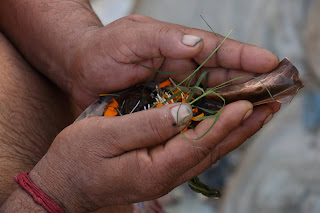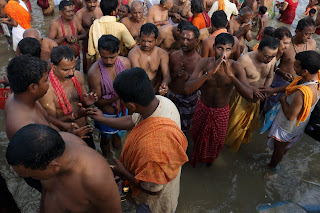17 September 2020, Kolkata, India ; Mahalaya is an integral occasion in the ethos of West Bengal as it marks the ushering of the festive spirit. It has two dimensions, namely, Devipaksha or the prayer which is offered to God and Pitripaksha or the worship and penance of one’s ancestor. Pitripaksha is also known as Shraddha or the ritual in which food is offered with a sense of affection and gratitude. On this day, Hindus pay their respect to their ancestors and this is known as Pindadana. On this very day Pitripaksha ends and the Devipaksha begins. Mahalaya is also the most suitable time for tantric practices and offering to the Goddess Chandi. Occurring every year in autumn or the 'sharot kaal', Mahalaya reminds every Bengali of Durga Puja that commences exactly after seven days. It is believed that the Goddess Durga pays a visit to the earth for a period of four days only and Mahalaya marks a kind of invitation to the mother goddess to descend on earth through chanting mantras.
Thursday, September 17, 2020
Mahalaya Torpon
Mahalaya is the last day of the Pitru Paksha and is also observed as the final day to conduct the shraadh ceremony if one has missed any of the dates during the preceding fortnight. Bengalis take a dip in the holy Ganga and some even perform torpon for their departed relatives. Mahalaya also heralds the festive period. With the Pitru Paksha over, it announces the Devi Paksha where Devi Durga is invoked with “jago tumi jago” which is an invitation for the goddess to come to earth.
Each year, people go to the river Ganges to wash their sins, and pray for the well being of their ancestors. They offer food, water and prayers for them. Kolkata – the city of joy, being at the last end of the river, is the home to the biggest prayers. A place where the urban chaos and the rustic mayhem both gather in unison. The Ghats are filled up with people who come from different stratas.
- by Ayan Biswas
Subscribe to:
Comments (Atom)





